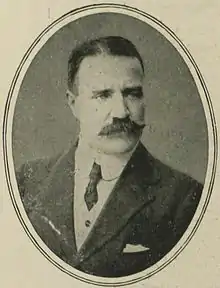Harland Bowden
Lieutenant-Colonel George Robert Harland Bowden (1873 – 10 October 1927) was a British mechanical engineer and Conservative Party politician.

Born in Durham, at the age of 15 he was apprenticed to Lambton Collieries whilst attending classes at Durham College of Science.[1][2]
In 1890 he moved to South Wales as improver for the ironworks at Tondu. In 1891 he became assistant engineer and chief draughtsman at Cyfarthfa Ironworks, Merthyr Tydfil.[1] He returned to North East England in 1896 as manager of D Selby Bigge and Company, an engineering company based in Newcastle. In 1902 he founded his own company, G Harland Bowden and Company, consulting engineers of Victoria Street, London. The firm specialised in the design and installation of colliery and factory plants.[1] In 1908 he became a Member of the Institute of Mechanical Engineers.[1]
In 1907 Bowden was granted a Volunteer Force commission in the Royal Garrison Artillery.[3][4]
Bowden was active in Conservative Party politics, and in April 1912 was adopted as the party's prospective candidate for the parliamentary constituency of North East Derbyshire.[5] In April 1914 the sitting Labour Party member of parliament for North East Derbyshire died, causing a by-election.[6] The by-election was held on 20 May, and Bowden was elected to the Commons, gaining the seat for the Conservatives with a majority of 314 votes.[7] During World War I Bowden became commanding officer of 17th (Empire) Battalion, the Royal Fusiliers, a war-formed unit.[8] He continued to hold his parliamentary seat during the war, but found himself estranged from the Conservative Party, going so far as to issue libel proceedings against a party official. At the 1918 general election he defended his seat as an Independent Conservative, opposed by a Conservative candidate who had the support of the Coalition Government.[9] He lost his seat to the Liberal candidate, finishing in third place. In October 1919 he was awarded 125 pounds in damages for libel against the vice-chairman of the North East Derbyshire Unionist Association.[10] By the time of the 1924 general election Bowden had repaired his ties to the Conservatives, and stood as the party's candidate in North East Derbyshire once more.[11] He was unsuccessful, with the Labour Party holding the seat.[12]
He died suddenly at his home, "Rodney", Belmont Hill, St Albans in October 1927, aged 54.[4][13]
References
- "1927 Obituary". Grace's Guide. Retrieved 4 April 2014.
- Robert Harland Bowden (2 January 1920). "If I Could Begin Again". Daily News (Perth, Western Australia). p. 4.
- "No. 28087". The London Gazette. 9 December 1907. p. 8610.
- "Deaths". The Times. 11 October 1927. p. 1.
- "Derbyshire (North-East)". The times. 29 April 1912. p. 6.
- "Three-Cornered Fight In Derbyshire". The Times. 8 May 1914. p. 5.
- "Unionist Gain In Derbyshire". The Times. 21 May 1914. p. 8.
- H C O'Neill (1922). The Royal Fusiliers in the Great War. William Heinemann. p. 13.
- "Election Items". The Times. 10 December 1918. p. 10.
- "High Court Of Justice". The Times. 18 October 1919. p. 4.
- "The General Election. Nominations". The Times. 20 October 1924. p. 7.
- "General Election, 1924.-Full Polling Results". The Times. 31 October 1924.
- "No. 33392". The London Gazette. 8 June 1928. p. 3986.